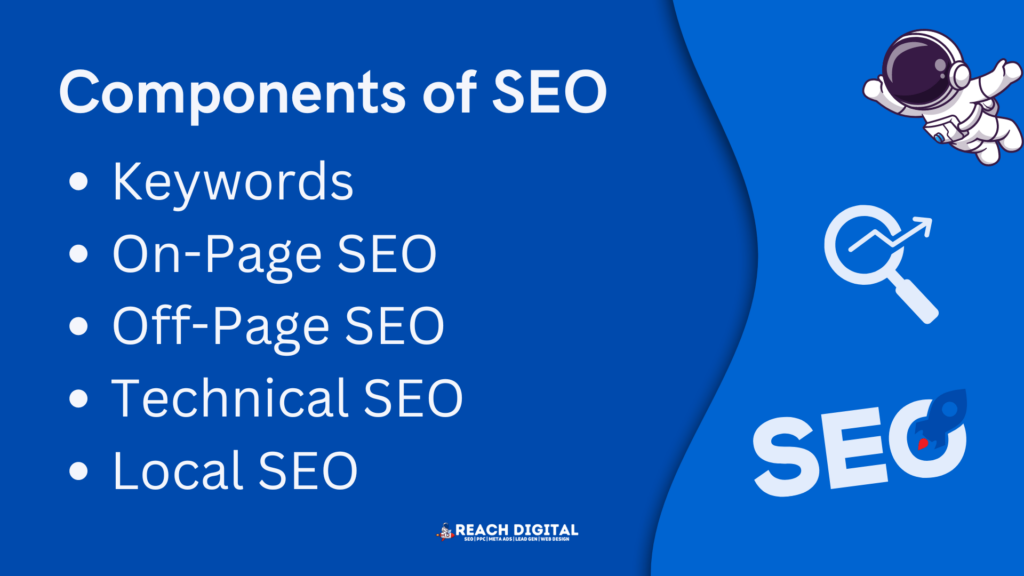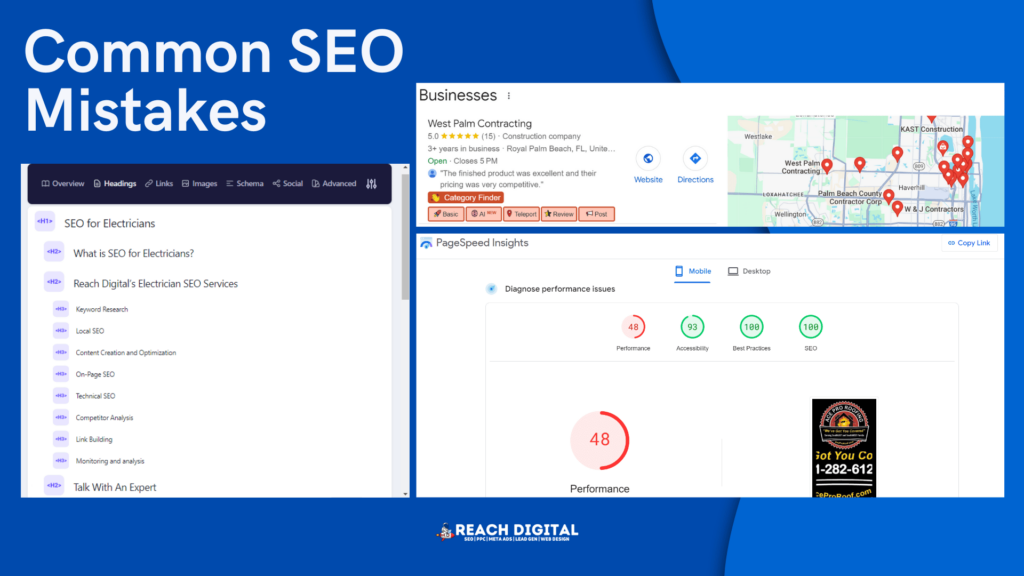Struggling to get more clients through your website? You’re not alone. Many contractors find it challenging to stand out in the crowded online space. With so many businesses competing for attention, it’s easy to feel lost in the mix.
Traditional methods like word-of-mouth and flyers have their place, but in today’s digital age, having a strong online presence is crucial. This is where contractor Search Engine Optimization (SEO) comes in.
SEO is all about enhancing your website so that it ranks higher on search engine results pages (SERPs). Higher rankings mean more visibility, and more visibility means more potential clients finding your contracting business.
You don’t need to be a tech expert to understand and implement basic SEO strategies. In this simple guide, we’ll break down the essentials of SEO, and how supporting contractor digital marketing services can help you further build your online presence. Let´s start with the basics.
Table of contents
What is Contractor SEO?
Search Engine Optimization (SEO) is the practice of optimizing a website or online content to improve its visibility and ranking on search engine results pages (SERPs). The ultimate goal of SEO is to attract organic (non-paid) traffic from search engines like Google, Bing, and Yahoo.
How Does SEO Work?
Doing SEO for contractors might sound complex, but it boils down to making your website more attractive to search engines like Google. When someone searches for services you offer, search engines use algorithms to determine which websites show up first.
In order to understand how SEO works, it’s crucial to be acquainted with its components.
Components of SEO
To leverage Contractor SEO, it’s essential to understand its core components. These elements work together to boost your website’s visibility and search engine ranking, driving more organic traffic to your site.
Keywords
Keywords are the words or phrases that users type into search engines when looking for information, products, or services. Effective contractor search engine optimization begins with thorough keyword research to identify the terms your potential customers are using.
By integrating these keywords strategically into your website content, you can attract relevant traffic. It’s important to choose both broad and specific (long-tail) keywords to cover various search intents, ensuring your site appears in a wide range of search queries.
On-Page SEO
On-page SEO involves optimizing individual web pages to rank higher and earn more relevant traffic in search engines. This includes several key practices:
- Title Tags and Meta Descriptions: Crafting compelling titles and descriptions that include target keywords can improve click-through rates.
- Header Tags (H1, H2, H3): Using header tags to structure content makes it more readable and helps search engines understand the page’s hierarchy.
- Keyword Placement and Density: Strategically placing keywords in your content, while avoiding keyword stuffing, ensures search engines recognize the relevance of your page.
- Content Creation and Optimization: High-quality, informative content that addresses user needs is crucial. Including images and videos can enhance user engagement and provide additional SEO value.
- Internal Linking: Linking to other relevant pages on your site can improve navigation and help distribute page authority throughout your website.
Off-Page SEO
Off-page SEO focuses on activities outside your website that influence its authority and visibility. The most significant aspect of off-page SEO is building high-quality backlinks from reputable sites, which act as votes of confidence for your content. Effective strategies include:
- Guest Posting: Writing articles for other websites in your industry can help you gain backlinks and exposure.
- Directory Submissions: Listing your business in online directories can improve your online presence and generate backlinks.
- Social Media Engagement: Active participation on social media platforms can drive traffic to your site and build brand awareness.
- Influencer Outreach: Collaborating with industry influencers can increase your credibility and expand your reach.
Technical SEO
Technical SEO refers to optimizing the backend aspects of your website to ensure it runs smoothly and is easily crawlable by search engines. Key elements include:
- Site Speed and Performance: Faster-loading sites provide a better user experience and are favored by search engines.
- Mobile-Friendliness: With the increasing use of mobile devices, ensuring your site is mobile-friendly is essential for maintaining visibility in search results.
- Secure Connections (HTTPS): Implementing HTTPS ensures a secure connection, which can improve trust and search rankings.
- XML Sitemaps and Robots.txt: Creating an XML sitemap helps search engines index your site more effectively, while a robots.txt file can control which pages are crawled.
- Fixing Broken Links and Redirects: Ensuring there are no broken links and properly managing redirects improves user experience and search engine indexing.
Local Search Engine Optimization
Local SEO for contractors is critical for those who rely on local clientele. Optimizing your online presence for local searches can increase visibility and attract nearby customers. Key practices include:
- Google My Business Optimization: Claiming and optimizing your Google My Business listing ensures your business appears in local search results and Google Maps.
- Local Citations and Directory Listings: Consistent business information across online directories and citation sites can improve local search rankings.
- Online Reviews: Collecting and managing customer reviews can enhance your reputation and influence local search visibility.
- Localized Content: Creating content that addresses local issues and uses local keywords can attract and engage a local audience.

How SEO Can Benefit Your Contracting Business
Whether you’re a general contractor, plumber, electrician, or any other type of contractor, investing in contractor SEO can provide significant returns and help you stay ahead in a competitive market. This is why:
- Increased Online Visibility: By optimizing your website for search engines, you increase the chances of appearing in search results when potential clients look for contractor services in your area. This visibility is crucial in attracting new customers who may not be aware of your services.
- Targeted Traffic: Getting contractor SEO services helps attract visitors who are actively searching for the services you offer. By targeting specific keywords related to your business, you ensure that the traffic to your site is relevant, increasing the likelihood of conversions.
- Higher Credibility and Trust: Websites that rank higher in search results are often perceived as more credible and trustworthy by users. Implementing SEO best practices can help establish your reputation as a reliable contractor, encouraging potential clients to choose your services over competitors.
- Cost-Effective Marketing: Compared to traditional advertising methods, SEO is a cost-effective strategy. Once your website starts ranking well, you can enjoy sustained traffic without the recurring costs associated with pay-per-click advertising or other paid marketing campaigns.
- Improved User Experience: Part of SEO involves optimizing your website for better usability. A well-structured, fast-loading, and mobile-friendly site enhances user experience, which not only helps in SEO rankings but also ensures visitors have a positive interaction with your brand.
- Local SEO Advantage: Contractors often serve specific geographic areas. Local SEO for contractors focuses on optimizing your online presence to attract local customers. This includes optimizing your Google My Business profile, gathering positive reviews, and ensuring your NAP (Name, Address, Phone Number) information is consistent across the web.
- Competitive Edge: Many contractors may not fully utilize SEO, giving you a competitive edge if you invest in optimizing your website. By ranking higher than your competitors, you can capture a larger share of the market.
- Long-Term Results: Unlike paid advertising, which stops generating leads once you stop paying, the effects of good SEO are long-lasting. While it requires ongoing effort, the benefits compound over time, providing sustained visibility and traffic.
- Insight into Customer Behavior: SEO tools and analytics provide valuable insights into how visitors find and interact with your website. This data can help you understand customer behavior, preferences, and trends, allowing you to refine your services and marketing strategies accordingly.
- Enhanced Brand Awareness: Consistently appearing in search results helps build brand awareness. Even if potential clients don’t click on your site immediately, repeated exposure to your brand name can lead to increased recognition and trust over time.
How Do You Measure SEO Success?
Just like any other goal, tracking your progress and success in implementing SEO for your website will go a long way in ensuring you’re on the right track. This process involves setting up tools to track performance, understanding key metrics, and using data to refine your approach:
1. Set up Google Analytics and Google Search Console
Google Analytics and Google Search Console are essential tools for tracking your website’s SEO performance.
- Google Analytics: This tool provides detailed insights into your website traffic, including where your visitors come from, how they interact with your site, and which pages are most popular.
How To Set Up: create a Google Analytics account, add your website, and install the tracking code on your site. This will allow you to monitor various metrics like user behavior, session duration, and traffic sources. - Google Search Console: This tool helps you understand how Google views your site and how it performs in search results.
How to Set Up: Verify your site ownership through methods such as HTML file upload, domain name provider, or Google Analytics. Google Search Console provides data on search queries, clicks, impressions, and any issues that might affect your site’s search performance.
2. Take Note of Key Metrics
Understanding key SEO metrics is vital for measuring success and making informed decisions. Here are some important metrics to monitor:
- Organic Traffic: The number of visitors coming to your site through unpaid search results. An increase in organic traffic indicates that your SEO efforts are paying off.
- Bounce Rate: The percentage of visitors who leave your site after viewing only one page. A high bounce rate might suggest that your content isn’t engaging or relevant to visitors’ expectations.
- Conversion Rate: The percentage of visitors who complete a desired action (e.g., filling out a form, making a purchase). Tracking conversions helps assess the effectiveness of your site in achieving business goals.
- Keyword Rankings: Monitoring where your site ranks for target keywords helps you understand your visibility in search results. Tools like Google Search Console, Ahrefs, and Moz can track keyword rankings.
- Backlinks: The number and quality of external links pointing to your site. High-quality backlinks improve your site’s authority and search ranking.
- Page Load Speed: Faster-loading pages enhance user experience and are favored by search engines. Google PageSpeed Insights can help you monitor and improve page speed.
3. Use Tools to Monitor SEO Performance
Several tools can help you track and analyze your SEO performance:
- Ahrefs: Offers comprehensive tools for keyword research, backlink analysis, and tracking keyword rankings. It provides insights into your competitors’ SEO strategies as well.
- Moz: Known for its user-friendly interface, Moz provides tools for keyword research, site audits, and tracking search visibility. Moz’s Domain Authority metric is useful for assessing your site’s authority.
- SEMrush: An all-in-one tool that offers features for keyword research, competitor analysis, site audits, and tracking SERP positions. It’s particularly useful for identifying opportunities and areas for improvement.
- Google Analytics and Google Search Console: As mentioned earlier, these are fundamental tools for tracking and analyzing website performance and search visibility.
10 Common SEO Mistakes for Contractors
Achieving SEO success requires careful planning and execution, but even small missteps can hinder your progress. Here are ten common SEO mistakes that contractors should avoid to ensure their efforts are not put to waste.
- Keyword Stuffing: It involves overloading your content with keywords in an unnatural way, aiming to manipulate search engine rankings. This can lead to poor readability and can be penalized by search engines. Instead, focus on using keywords naturally and contextually within high-quality content related to your contracting services.
- Ignoring Mobile Optimization: With a significant amount of web traffic coming from mobile devices, not optimizing your site for mobile users can hurt your rankings and user experience. Ensure your website is mobile-friendly by using responsive design and optimizing page speed for mobile devices. This is particularly important for contractors as potential clients often search for services on the go.
- Neglecting Local SEO: For contractors who rely on local customers, failing to optimize for local search can mean missing out on valuable traffic. Claim and optimize your Google My Business listing, use local keywords, and encourage customer reviews to improve your local search visibility.
- Duplicate Content: Having duplicate content on your site can confuse search engines and lead to lower rankings. This often happens with content that is duplicated across multiple pages or sites. Use canonical tags to address duplicate content issues and ensure each page has unique, valuable content related to your contracting services.
- Overlooking Meta Tags: Meta tags, including title tags and meta descriptions, play a crucial role in SEO. Neglecting to optimize these tags can lead to missed opportunities for improving click-through rates and search visibility. Ensure each page has unique, keyword-rich meta tags that accurately reflect the page content and the services you offer.
- Ignoring Site Speed: A slow-loading website can negatively impact user experience and search rankings. Use tools like Google PageSpeed Insights to test your site’s speed and make improvements such as optimizing images, leveraging browser caching, and reducing server response times. Fast-loading sites are particularly important for contractors to keep potential clients engaged.
- Lack of High-Quality Backlinks: Backlinks from reputable and relevant sites are essential for building your site’s authority. Failing to acquire quality backlinks or relying on low-quality or spammy links can hinder your SEO efforts. Focus on earning backlinks through valuable content, guest posting, and building relationships with industry influencers in the contracting field.
- Poor Internal Linking Structure: Internal links help users and search engines navigate your site and understand its structure. A poor internal linking strategy can lead to a disorganized site and missed SEO opportunities. Create a logical link structure with descriptive anchor text to guide users and distribute page authority, especially highlighting your various contracting services.
- Not Updating Content Regularly: Outdated content can affect your site’s relevance and rankings. Regularly update your content to ensure it remains fresh, accurate, and useful. Adding new blog posts, updating old pages, and refreshing outdated information can help maintain your site’s authority and engagement, keeping your contracting business at the forefront.
- Failing to Track and Analyze Performance: Without tracking and analyzing your SEO performance, you won’t know what’s working or where improvements are needed. Use tools like Google Analytics and Google Search Console to monitor key metrics, assess your SEO strategies, and make data-driven adjustments to enhance your results.

Marketing Solutions That Will Help Boost Your SEO
There are several marketing solutions tailored for contractor businesses that can make a significant impact on your search engine rankings. Let’s explore some effective strategies that can help elevate your online presence.
- Content Marketing: Content is king in the world of SEO. Regularly publishing high-quality content related to your contracting services can help you rank higher in search results. Think about creating blog posts, how-to guides, case studies, and even video tutorials.
For example, a blog post on “How to Choose the Right Contractor for Home Renovation” can attract potential clients and showcase your expertise. The key is to provide value, answer common questions, and integrate relevant keywords naturally. - Social Media Engagement: Social media platforms are not just for staying in touch with friends and family; they’re powerful tools for boosting your SEO as well. By actively engaging on platforms like Facebook, Instagram, and LinkedIn, you can drive traffic to your website and improve your search rankings.
Share your blog posts, highlight customer testimonials, post project photos, and interact with your audience. Social signals can influence search engine algorithms, showing that your business is active and engaged. - E-Mail Marketing: Email marketing is a fantastic way to stay connected with your clients and keep them informed about your services. Send out regular newsletters with updates, special offers, and links to your latest blog posts or case studies.
Not only does this keep your audience engaged, but it also drives traffic to your website, which can positively impact your SEO. Plus, personalized emails can help build trust and encourage repeat business. - Local Listings and Reviews: For contractors, local SEO for contractors is crucial. Ensure your business is listed on local directories such as Google My Business, Yelp, and Angie’s List. Encourage satisfied clients to leave positive reviews. These listings and reviews not only help improve your local search rankings but also build your online reputation. Potential clients often rely on reviews to make decisions, so having a strong presence here is beneficial.
- Networking and Partnerships: Building relationships with other local businesses can be a win-win. Consider partnering with suppliers, real estate agents, or interior designers to cross-promote each other’s services.
For instance, you could write a guest blog post for a local home improvement store, which in turn links back to your website. This not only drives referral traffic but also boosts your SEO through quality backlinks. - Pay-Per-Click (PPC) Advertising: While SEO focuses on organic traffic, PPC advertising can complement your efforts by driving targeted traffic to your site. Platforms like Google Ads allow you to bid on keywords relevant to your contracting services.
When done correctly, PPC can increase your visibility, leading to more clicks and potential clients. The increased traffic can also positively influence your organic search rankings over time. - Video Marketing: Video content is highly engaging and can significantly boost your SEO. Create videos showcasing your projects, offering tips, or explaining your services. Upload these videos to YouTube and embed them on your website.
YouTube is the second largest search engine, and having a presence there can drive traffic and improve your search rankings. On top of that, videos tend to keep visitors on your site longer, which is a positive signal to search engines.
Get The Best SEO Services for Contractor Businesses
With consistent effort and the right strategies, your contractor business can climb search engine rankings, reach a broader audience, and ultimately, grow and thrive in the digital landscape. There’s no doubt that optimizing for search engines can be overwhelming, so why not get contractor SEO services instead?
At Reach Digital, we provide you with the best SEO services for your contractor business. Our team of SEO experts specializes in understanding the unique needs of contractors and crafting tailored strategies to boost your online presence. From comprehensive keyword research to on-page and off-page optimization, we handle every aspect of SEO to ensure your website ranks higher and attracts more potential clients.
Let us take the hassle out of SEO, so you can focus on delivering the best services for your customers. Schedule a consultation for your contractor business here. Get started here.




